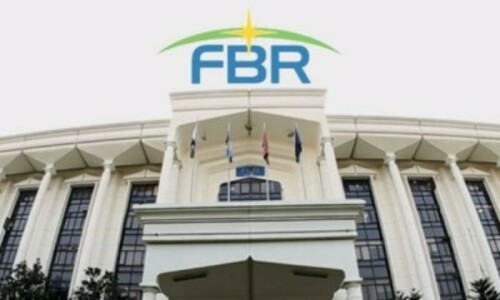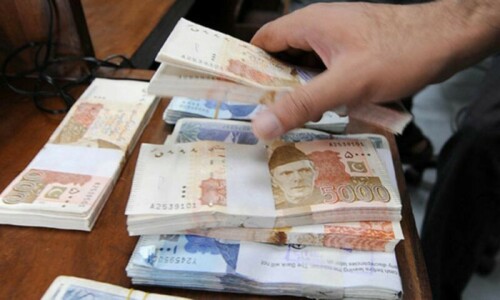ISLAMABAD: Tax collection by the Federal Board of Revenue (FBR) fell short of the target by almost Rs33 billion in February, mainly due to lower collection of domestic taxes and customs duty, provisional figures showed on Thursday.
The revenue collection in February stood at Rs681bn against a projected target of Rs714bn. However, it increased by over 30 per cent compared to Rs519bn collected in the same month last year.
These figures would further improve slightly after book adjustments have been taken into account.
The lower-than-targeted collection in February comes after a Rs9bn shortfall in January. The failures in the two consecutive months will cause problems for the FBR’s overall annual revenue collection target for the current fiscal year.
During the first eight months (July-February) of 2023-24, the FBR collected Rs5.831 trillion, exceeding the Rs5.829tr target by Rs2bn. As a result, the shortfall witnessed in February and January was covered owing to higher collection in December.
The government has projected a revenue collection target of Rs9.415tr for this fiscal year, almost 30pc higher than the previous year’s revised collection figures of Rs7.2tr.
During this time, tax refunds increased by more than 28pc.
An official report of the FBR said the increase in import taxes had slowed due to a variety of reasons, including downward revisions in import duties over time and, more recently, restrictions on import licences imposed by the State Bank of Pakistan to contain the balance of payments position in the aftermath of foreign exchange shortages.
The revenue collection from import dues, however, takes into account the impact of improvements in import value, which resulted in Rs151bn in collections, as well as the anti-smuggling drive, which increased by about 69pc this fiscal year compared to last year.
There is potential to improve anti-smuggling efforts by boosting the customs force in Balochistan, which currently has just 378 anti-smuggling workers, which undermines enforcement efforts.
The revenue generation from domestic taxes is a good change. Domestic tax collection now accounts for over 64pc of all revenues collected in the current fiscal year, owing mostly to inflation rates of roughly 30pc. Concurrently, the share of import tariffs has fallen to 36pc from more than 50pc just three years earlier.
The primary driver of impressive growth in income tax collection is because of high collections from banks, petroleum products, textiles, power, food goods, and services.
Published in Dawn, March 1st, 2024














































Dear visitor, the comments section is undergoing an overhaul and will return soon.